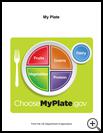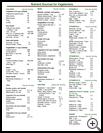
Vegetarian Diet
________________________________________________________________________
KEY POINTS
- A vegetarian diet does not include meat, poultry, or fish. Some vegetarians also avoid other animal products, such as eggs and dairy.
- If your diet is too low in protein or other nutrients, or too high in sweets, sodas, and snack foods, it may be unhealthy.
- Check with your healthcare provider if you think you may not be getting all the nutrients you need.
________________________________________________________________________
What is a vegetarian diet?
A vegetarian diet does not include meat. Vegetarians do not eat meat, poultry, or fish. Many vegetarians also avoid other animal products such as gelatin, rennet (used to make some kinds of cheese), and animal fats. Vegetarians who eat eggs and dairy products are called ovo-lacto vegetarians. People who avoid all animal products are called vegans.
A well-planned vegetarian diet can be good for your health. By not eating meat, you eat less cholesterol and less saturated fat. This may lower your risk of heart disease, gallstones, stroke, and some types of cancer.
Will I get all of the nutrients I need?
All of the rules for a healthy diet are true for a vegetarian diet. You need to eat a variety of foods in the right amounts. You may have to work harder to get all of the nutrients you need if you eat no animal products at all.
A well planned vegetarian diet is safe. If it is too low in protein or other nutrients, or too high in sweets, sodas, and snack foods, it may be unhealthy. Here are some of the nutrients you need to be sure to get from your diet:
- Calcium: Milk products are one of the best sources of calcium. Calcium is also in many other foods such as soy or rice milk, broccoli, leafy green vegetables, almonds and almond butter, sesame seeds, beans, and soy. However, the calcium in these foods is not absorbed as well as the calcium in milk products. Calcium has been added to some foods (fortified), which makes it easier to meet daily calcium needs, but it still can be hard for your body to get enough calcium if dairy foods are not a part of your diet. Ask your healthcare provider if you should take calcium supplements, and which kind you should take.
- Iron: Plant foods high in iron include beans, lentils, spinach and other dark green, leafy vegetables, peanut butter, and soy nuts. It’s harder for the body to absorb iron from plants than from meat, poultry, and fish. Eat foods that contain vitamin C, such as citrus fruits, broccoli, and tomatoes, when you eat plant foods that have iron. Eating these foods together helps the body to absorb the iron better.
- Zinc: Zinc is not as easy for the body to absorb from plant foods as it is from animal products. Because of this, you may need to eat more zinc than people who eat meat. Good sources of zinc include whole grains, breads and fortified cereals, nuts and dried beans.
- Vitamin B-2: Vitamin B2, or riboflavin, is found in green vegetables such as asparagus and broccoli. However, vegetables do not have as much vitamin B2 as milk products, eggs, and meat. You may need a supplement to get all the vitamin B2 that your body needs.
- Vitamin B-6: Also known as pyridoxine, vitamin B-6 is found in peas, beans, lentils, bananas, and fortified breads and cereals. Vegetarians usually get enough of this vitamin from their diet.
- Vitamin B-12: Vitamin B-12 is found naturally in animal products such as fish, liver, eggs, and dairy. When you read food labels, look for the words cyanocobalamin or cobalamin in the ingredient list. These are the forms of vitamin B-12 that are most easily absorbed.
- Vitamin D: Vitamin D is added to some soy, rice, and almond milks, yogurt, some cereals, and juices. The food label will tell you if a food is fortified with Vitamin D. Your skin makes vitamin D when it is exposed to sunshine, so spend some time outdoors. Ask your healthcare provider if you should take a vitamin D supplement to make sure that you are getting enough.
- Omega-3 fatty acids: Plant foods high in linolenic acid (omega 3) are flaxseed and flaxseed oil, chia seeds, canola oil, walnuts, seaweed, soybeans, and soybean oil. Some margarines and nondairy milks are now fortified with omega-3s. You can also take vegan supplements made from algae.
- Protein: There are many plant sources of protein, such as beans, lentils, nuts, seeds, soy, quinoa, whole grains, and hemp, and others. Be sure to eat a variety of foods to get the right mix of proteins.
If I am breast-feeding, will my breast milk be healthy for my baby?
If you get enough nutrients from whole grains, fruits, vegetables, beans, nuts, seeds, and oils, you and your baby can have a healthy diet. Make sure that you get enough zinc, iron, vitamin B-12, and vitamin D. Your healthcare provider may tell you to keep taking prenatal vitamins while breast-feeding.
Breast-fed babies should also take a vitamin D supplement. You can buy liquid multivitamin drops with vitamin D without a prescription. Ask your provider for a recommendation.
Breast-fed babies who are 4 to 6 months old and not yet getting solid food should take supplements of iron. This needed iron is provided by infant cereals when you start feeding your baby solid foods.
How do I know if I am eating a healthy diet?
If you feel good, your skin is clear, and you have plenty of energy, you are probably eating a healthy diet. If you are not getting enough vitamins or minerals, you may have symptoms such as:
- Rashes
- A painful, swollen tongue
- Tiredness
- Irritability
- Depression
- Pale skin
- Trouble focusing
Check with your healthcare provider if you think you may not be getting all the nutrients you need.
Where can I get more information?
You can get more information from:
- The Vegetarian Resource Group
http://www.VRG.org - USDA ChooseMyPlate
https://www.choosemyplate.gov/ - Academy of Nutrition and Dietetics
http://www.eatright.org


